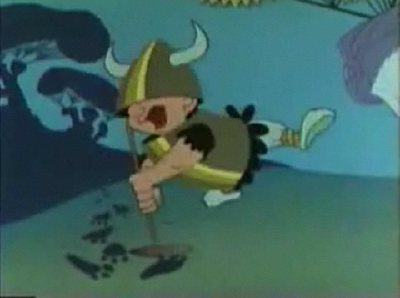
This morning I wrote a bit about the origins of the phrase, "the rabbit died," which was a common, if inaccurate, euphemism for a positive result on a pregnancy test, which in post-WWII America was called the rabbit test. [The idea was that the test rabbit only died if the urine it was injected with contained the pregnancy hormone hCG. In fact, every rabbit died, because it was dissected to detect changes in its ovaries. I guess the 1950's culture that wouldn't permit the word "pregnant" to be uttered on TV wouldn't embrace "my urine triggered growths in the rabbit's ovaries!" either.]
Anyway, I joked about the possible hidden pregnancy symbolism in the greatest cartoon ever made, Chuck Jones' classic 1957 Bugs Bunny short, "What's Opera, Doc?" which Elmer Fudd runs around singing "Kill the wabbit!" in Wagnerian drag.
Well, when I wrote that, it had been a while since I'd seen "What's Opera, Doc?" So I watched it online. Holy Moley, the symbolism's about as hidden as a bolt of lightning, and the sexual subtext's as subtle as a sharp spear thrust into a rabbit hole. While the symbolism is unequivocal, I'll be damned if I can tell you what it all means. If any of you armchair Freudian Cold War scholars has a theory of what all this rage, seduction, betrayal, and wabbit killing tells us about the mid-century American male's view of procreation, share your insights below. The best explanation--or the one chosen at random, I haven't decided yet--will win a prize of some kind, probably one of the last "daddy type" t-shirts in the world [depending on your t-shirt size].
Meanwhile, see the cartoon as you've never seen it before. I know I should wait for feedback from my American Studies dissertation committee, but here is my Wham Bam, thank you, Ma'am reading of "What's Opera, Doc?"
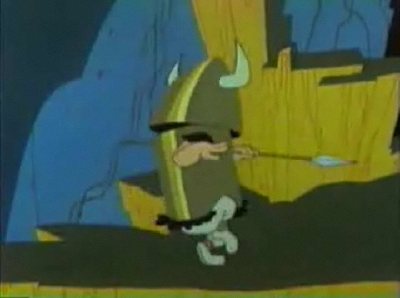
Intro: After creating a giant shadow that exaggerates his size and prowess and sets up unreasonable performance expectations, the camera pans down to reveal a rather timid Elmer Fudd, who is wearing a distinctly missile- or phallus-shaped suit of armor and helmet.

In psyching himself into an excited, blind frenzy with repeated chants to "kill the wabbit," Fudd comes across a hole. Consequence and reason be damned, he begins repeatedly and violently thrusting his spear into the hole.
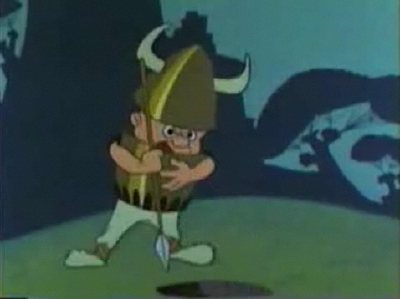
Bugs Bunny appears from a different hole nearby, and asks Fudd what he's doing. Fudd explains he is going to "kill the wabbit" with his "spear and magic helmet."
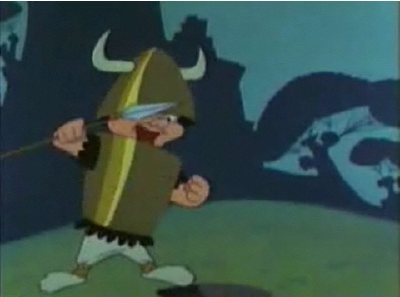
"Spear and magic helmet?"
"Spear and magic helmet!"
"Magic helmet?"
"Magic helmet!"
Bugs laughs at Fudd's magic helmet, which enrages Fudd, and he proves the power of his magic helmet by calling down lightning and destroying a tree. Too late, Fudd realizes Bugs got away.
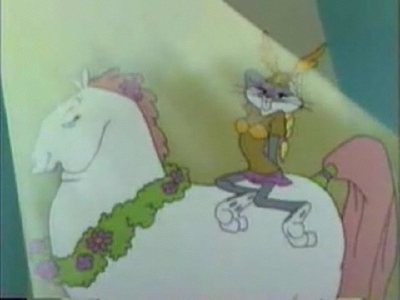
Act II: Bugs, whose penchant for cross-dressing and gender stereotype-challenging behavior is well documented, now appears as a voluptuous Valkyrie pin-up girl, riding the white horse.
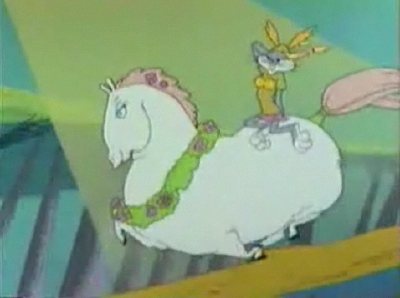
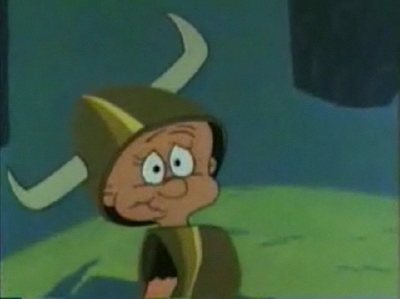
Fudd is rendered immobile, totally smitten by the warrior goddess's charms.
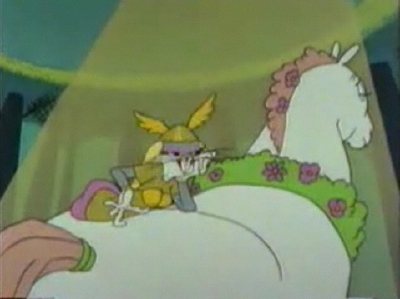
The horse presents its hind quarters to Fudd, a sign of courtship in many species, while Bugs coyly walks his/her fingers across the animal's buttcheek. Now a slave to his reproductive instincts, Fudd spins in place, flits his toes, and beckons the Valkyrie.
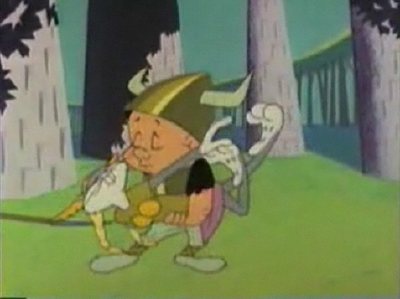
He takes the Valykrie in his arms, and a courtship/foreplay dance ensues
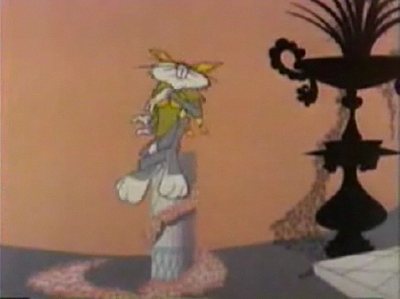
in which Bugs mounts a pole and tenses with ecstatic glee.
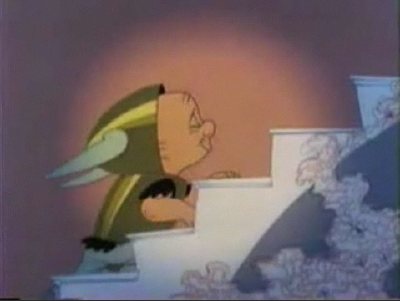
Bugs is now suddenly at the top of a mountain, lounging in repose and waiting for Fudd, who is still climbing
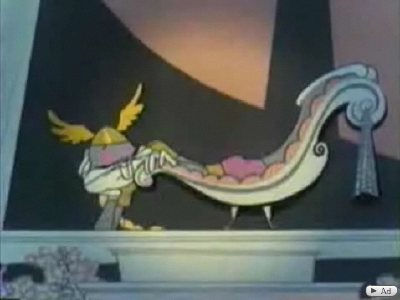
while Bugs keeps waiting, somewhat bored, for him to get there.
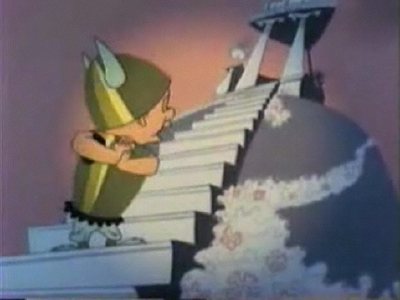
Fudd is proclaiming his love to Bugs/Brunhilde as he climbs.
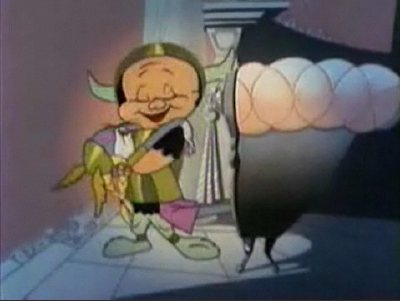
Finally, Fudd reaches the top of the peak and embraces Bugs.
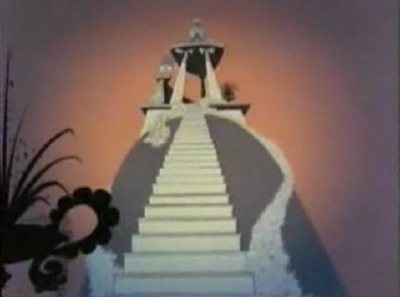
For a moment, it appears that they are at the top of the mountain together.
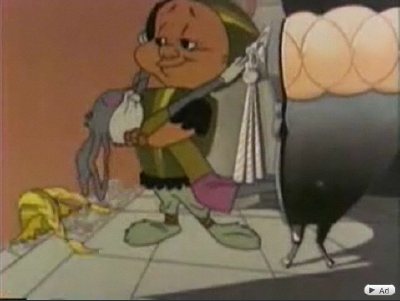
But just seconds into their ecstatic embrace, the helmet falls off of Bugs' head and bounces down the stairs. Fudd realizes--again, too late--that he has been deceived.
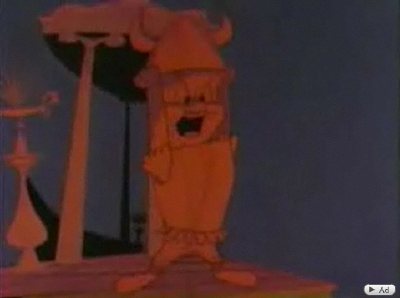
He is enraged, and vows revenge on the bunny/bitch who tricked him into this situation. Fudd races to the top of a mountain and calls down lightning strikes with his magic helmet.
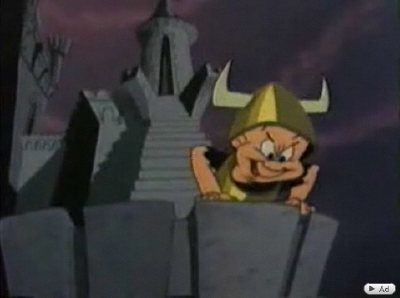
Blinded again, this time by vengeance and bloodlust, Fudd races to a parapet to see the result of his assault. Now stripped of his costume, the body of Bugs Bunny lies on a rock, illuminated by a beam of light through the clouds.
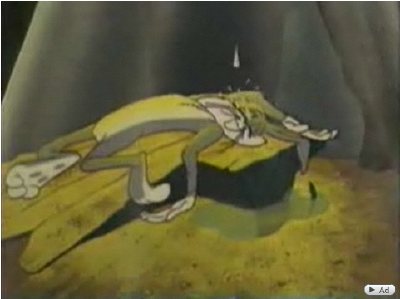
A white liquid drips onto the rabbit
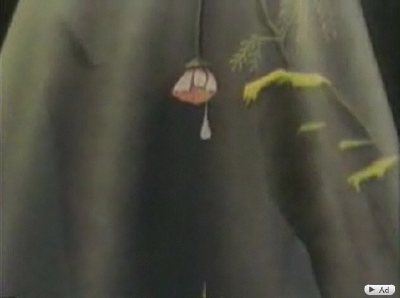
from a flower stem that curves and hangs above him.
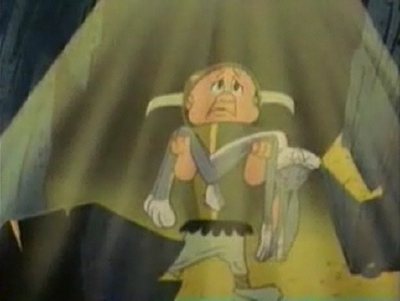
Shocked to realization of the implications of a dead rabbit, Fudd is now fraught with anxiety. His former life of hunting and adventure is suddenly ended. He picks up Bugs's limp body and staggers forward into a blinding light to face an unknown future.
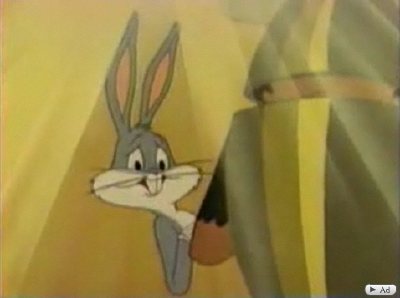
Just before the curtain drops, Bugs pops alive and asks, what did we expect, "a happy ending?" Given the overwhelming references to unintended pregnancy and impending fatherhood, the similarity to modern-day slang for a commitment-free erotic massage technique is assumed to be coincidental.
So. What's your analysis?

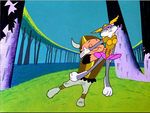


Uh, Greg? Is the six weeks still not up yet?
[lol, that's one reading I hadn't thought of -ed.]
Well, yes, the pronged phallus was pretty disconcerting. I also initially thought that Bugs' entry was on a unicorn, not just a horse - either way, a pretty virginal symbol.
Oh, my goodness. You know, I haven't seen that cartoon in years. Thanks for the screen caps.
I'll give you the phallic symbolizing, magic helmet part, but I'm not sure if we're talking about man's reluctance.
Here's my take - Guy's, make darn sure that you're not lusting after a cross-dresser or a confused female. And I'm not saying that just because my ex-wife is now married to another woman in San Francisco. Well....maybe I am.
To be fair, 'What's Opera Doc?' is an interpretation/compilation of Wagner's works.
I'd say any sexual symbolism is not so much a Freudian critique of Chuck Jones, but Chuck Jones critique of the 'barbaric' masculinity/sexuality he associated with the operas of Richard Wagner.
So, I wouldn't think of Chuck Jones as particularly repressed in his direction.